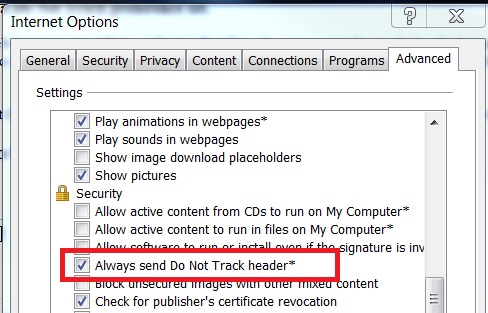Microsoft plans on turning off Do Not Track in upcoming browsers
Posted by: Timothy Weaver on 04/06/2015 09:34 AM
[
 Comments
]
Comments
]
The Do Not Track feature is being turned off in the upcoming versions of Internet Explorer and Spartan by Microsoft.
 Do Not Track is supposed to tell advertisers that you don't want your internet surfing to be tracked. All of the major browser vendors, including Google, Mozilla, Opera, Apple and Microsoft, support this feature, but that does not guarantee that the advertisers will honor it.
Do Not Track is supposed to tell advertisers that you don't want your internet surfing to be tracked. All of the major browser vendors, including Google, Mozilla, Opera, Apple and Microsoft, support this feature, but that does not guarantee that the advertisers will honor it.
Microsoft enabled it by default with the launch of Internet Explorer 10. Advertisers said they would honor DNT as long as it was not the default setting. However, Microsoft stuck to its guns.
Chrome and Firefox leave “Do Not Track” off by default.
Microsoft is reversing its decision in view of the official W3C standard for “Do Not Track.” This new draft explicitly notes that “the signal sent MUST reflect the user’s preference, not the choice of some vendor, institution, site or network-imposed mechanism outside the user’s control; this applies equally to both the general preference and exceptions.”
Microsoft Chief Privacy Officer Brendon Lynch said: “Put simply, we are updating our approach to DNT to eliminate any misunderstanding about whether our chosen implementation will comply with the W3C standard. Without this change, websites that receive a DNT signal from the new browsers could argue that it doesn’t reflect the users’ preference, and therefore, choose not to honor it.”
Given the voluntary nature of “Do Not Track,” it probably doesn’t matter all that much whether you turn it on or off anyway.
Source: Techcrunch
 Do Not Track is supposed to tell advertisers that you don't want your internet surfing to be tracked. All of the major browser vendors, including Google, Mozilla, Opera, Apple and Microsoft, support this feature, but that does not guarantee that the advertisers will honor it.
Do Not Track is supposed to tell advertisers that you don't want your internet surfing to be tracked. All of the major browser vendors, including Google, Mozilla, Opera, Apple and Microsoft, support this feature, but that does not guarantee that the advertisers will honor it. Microsoft enabled it by default with the launch of Internet Explorer 10. Advertisers said they would honor DNT as long as it was not the default setting. However, Microsoft stuck to its guns.
Chrome and Firefox leave “Do Not Track” off by default.
Microsoft is reversing its decision in view of the official W3C standard for “Do Not Track.” This new draft explicitly notes that “the signal sent MUST reflect the user’s preference, not the choice of some vendor, institution, site or network-imposed mechanism outside the user’s control; this applies equally to both the general preference and exceptions.”
Microsoft Chief Privacy Officer Brendon Lynch said: “Put simply, we are updating our approach to DNT to eliminate any misunderstanding about whether our chosen implementation will comply with the W3C standard. Without this change, websites that receive a DNT signal from the new browsers could argue that it doesn’t reflect the users’ preference, and therefore, choose not to honor it.”
Given the voluntary nature of “Do Not Track,” it probably doesn’t matter all that much whether you turn it on or off anyway.
Source: Techcrunch
Comments






